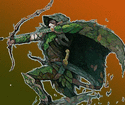Debate on Alignment
-
@0cce322f97:
In the forgotten realms, it is an inherrently evil act, no matter how terrible the person you are killing may be or what the justification is. Now, you may still be lauded as a hero if you killed some FR version of Hitler via assassination, but you'd still pick up those evil points afterwards.
it seems to me that this is something that we, as a community, should be a bit more flexible with. We surely dont stick to all other D&D rules, as written. Why would we have to stick to this as the absolute rule if we all know there are gray areas?
-
One issue that sometimes irks people about D&D alignment is that it's a very absolute thing in the game. Intention doesn't have to matter, just the action itself.
I know it irks me often…
-
Sounds like a grey area to me.
Assaulting the command post to kill or capture the leadership to end the war could be considered good.
Assaulting the command post to kill the leadership because you don't like them could be considered evil.
It's all dependent on PC motivation. If things like this come up for your PC discuss it with the DM team. You can also help by keeping a journal of your PC's thoughts (which I see you've already started
 ) so the DMs can understand the motivation more clearly if things are complicated.
) so the DMs can understand the motivation more clearly if things are complicated.
-
That's a question that's best answered on a case by case basis really, since individual factors of each case should give a reasonably clear indication of whether something qualifies as assassination or not.
Edit: Additonally, as some folks above have alluded to, real world morality does not always equate with forgotten realms concepts of evil. For instance taking Dwin's example there, if I paid somebody to assassinate Hitler in the real world, swell. In the forgotten realms, it is an inherrently evil act, no matter how terrible the person you are killing may be or what the justification is. Now, you may still be lauded as a hero if you killed some FR version of Hitler via assassination, but you'd still pick up those evil points afterwards.
-
I find its often interesting to look at real world examples.
Abraham Lincoln's Assassination: considered evil by most, right? The Kennedy's, John Lennon, Ghandis…
What about Hitler? If he had been assassinated, would that have been an evil act? Stalin? Both had many attempts on their lives. I think history has painted those acts as benevolent and humanitarian.
So, if someone tried to have the N'Jast General killed because the army had devastated Jiyyd and was on its way to Peltarch (just making this up) would that really be evil? Self-defense?
If Dwin hires someone to find and kill Ostromog (an evil Bugbear that has threatened to sit on the throne of Norwick and drink from Dwin's skull), is that evil? Self preservation?
Is it a question of lawful versus chaotic, because there is no order or "trial" to decide the fate?
Very interesting question and conversation.
I was once given evil points because I ran from foes that were stronger than me. The DM explained that by running, I could have led the monsters to areas where innocents could have been hurt. (Meanwhile, I was running to those areas for help from guards/adventurers). I still disagree with that decision and I wish I had escalated it more at the time.
-
@853de57c04=Kallethen:
I believe the rules of D&D specifically define assassination as a purely evil act. I think the Book of Vile Deeds would be the prime source for such information.
Yes, I understand what you are saying here, but my thought is, if you change assassination to raid where you are using soldiers to assault the command post instead of an assassin, is it still an evil act?
If so, ok, but, if not, how do you differentiate?
Mayhaps the question I am trying to ask is, when is it an assassination and when is it not?
-
@b6d64df531=Chrystoph:
I drop this entire morality question into the furball to help me understand where the limits are drawn.
Ah, I believe a common misconception about alignments is inherent in the way they gave them names. D&D alignments have some things in common with morality, but only some.
In particular, there are spells "Detect Evil/Good/Law/Chaos"… ever seen a spell that reveals how morally good, bad or how chaotic a person is?

-
I believe the rules of D&D specifically define assassination as a purely evil act. I think the Book of Vile Deeds would be the prime source for such information.
